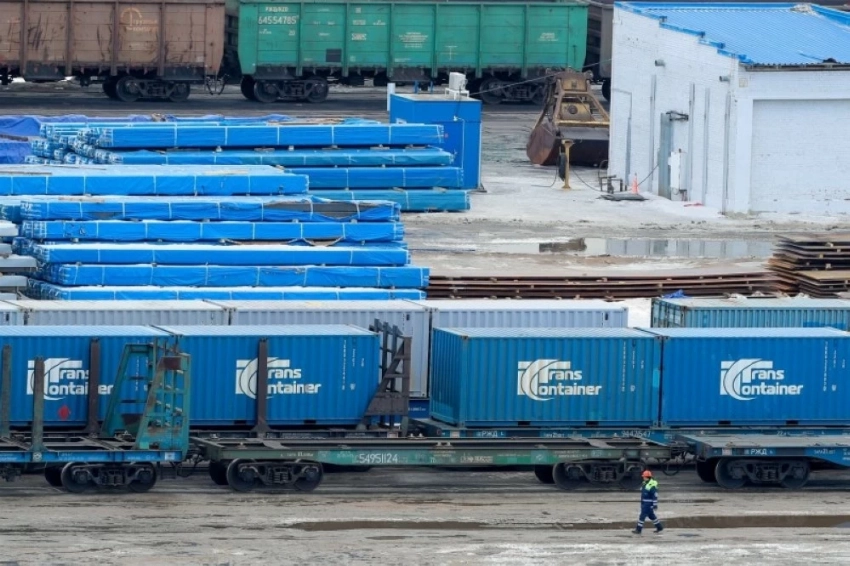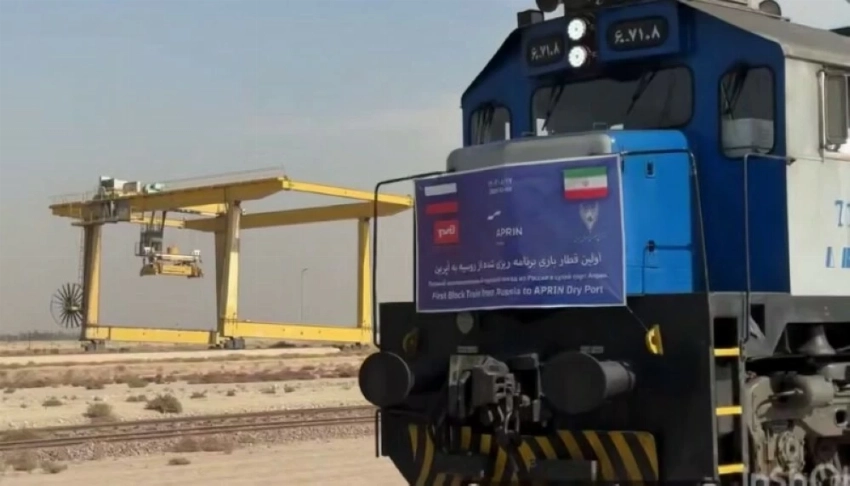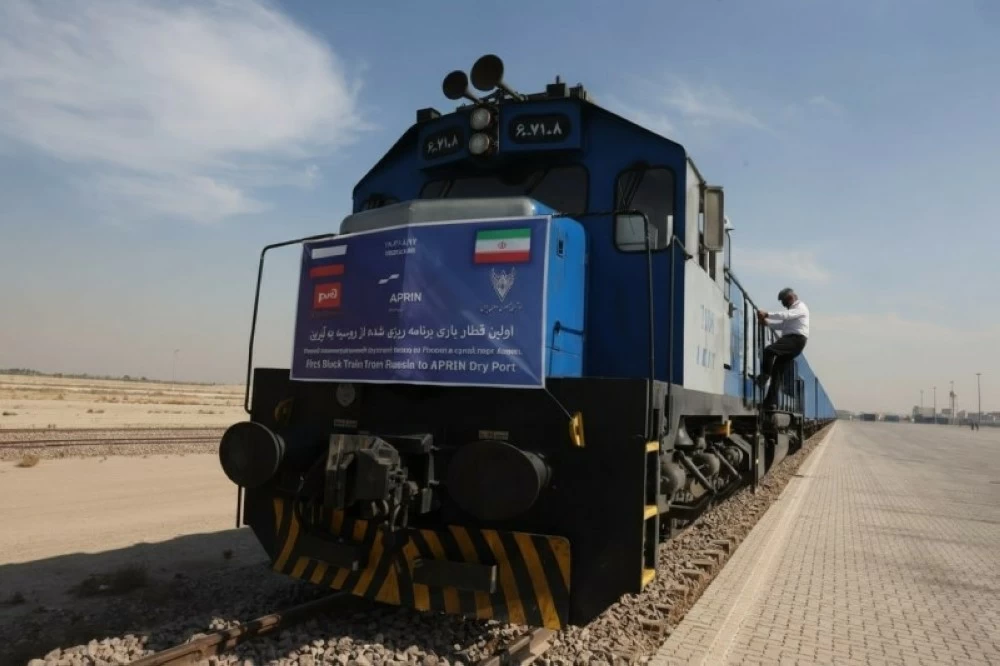وصل أول قطار شحن مجدول من روسيا إلى ميناء أبرين الجاف جنوب طهران أمس (السبت)، في رحلة استمرت 13 يوماً عبر الممر الدولي الشمال-جنوب، مُعلناً بداية حقبة جديدة في التبادل الاقتصادي الأوراسي وتعزيز الروابط اللوجستية بين طهران وموسكو.
حمل القطار 62 حاوية محملة بمنتجات زراعية وصناعية روسية، وانطلق من محطة كيبيك في روسيا أواخر أكتوبر، متجاوزاً حدود كازاخستان وتركمانستان قبل الدخول إلى إيران عبر الحدود البرية.
واستقبل القطار مسؤولو سكك حديد إيران في ميناء أبرين، وأشادوا بالإنجاز كـ«خطوة تاريخية» نحو تفعيل الممر الدولي الجديد، الذي يُعد بديلاً حيوياً للطرق التجارية التقليدية المعرضة للعقوبات الغربية.
ووصف نائب رئيس شركة سكك حديد إيران المهندس سعيد أسدي، الرحلة بأنها «نجاح مشترك يعكس التنسيق الدقيق بين الجهات الجمركية واللوجستية عبر الدول المشاركة»، مشيراً إلى رحلات أخرى أسبوعية تالية.
وجاء وصول القطار بعد محادثات مكثفة بين مسؤولي النقل الإيراني والروسي، ركزت على حل التحديات في النقل البحري عبر بحر قزوين وتوازن التجارة بين البلدين.
وفي تصريح لوكالة الأنباء الإيرانية، أكد وزير الطرق والمدن فرزان صديق أن هذا الإنجاز «سيفتح أبواباً لتصدير السلع الإيرانية إلى أسواق أوروبا الشمالية بتكلفة أقل، مع تعزيز دور إيران كمركز لوجستي إقليمي»، كما أشار إلى أن الرحلة غطت مسافة تزيد على 4000 كيلومتر، ما يقلل الوقت والتكاليف مقارنة بالطرق البحرية عبر قناة السويس.

يأتي هذا الحدث في سياق الجهود الأوراسية لشق طرق تجارية جديدة، خصوصاً بعد العقوبات الغربية على روسيا، إذ يُتوقع أن يصل حجم التجارة عبر INSTC إلى 20 مليار دولار في 2026.
ومع ذلك، يواجه المشروع تحديات مثل إكمال الخطوط السككية في إيران، مع خطط لإطلاق خط حاويات جديد بين ميناء ماخاتشكالا الروسي والموانئ الإيرانية عبر بحر قزوين.
وفي بيان مشترك، أعربت روسيا وإيران عن التزامهما بتوسيع الشراكة، مشددتين على أن «الأوراسيا اليوم أقوى من أي وقت مضى».
ويُعد الممر الدولي الشمال-جنوب مشروعاً نقلياً متعدد الوسائط يربط روسيا وآسيا الوسطى وإيران بالخليج العربي وجنوب آسيا، وهو يهدف إلى تقليل وقت النقل التجاري من 45 يوماً عبر قناة السويس إلى 13-15 يوماً فقط، ما يوفر تكاليف تصل إلى 30% ويحقق حجم تجارة يصل إلى 100 مليار دولار سنوياً بحلول 2030.
تم توقيع الاتفاقية الأساسية عام 2000 بين روسيا وإيران والهند، وانضمت إليها دول أخرى مثل أذربيجان وقازاخستان وتركمانستان، وسط التوترات الجيوسياسية الناتجة عن الحرب في أوكرانيا والعقوبات الغربية على روسيا، التي جعلت INSTC بديلاً حاسماً للطرق التقليدية.
The first scheduled freight train from Russia arrived at the Abrin dry port south of Tehran yesterday (Saturday), on a journey that lasted 13 days through the International North-South Corridor, marking the beginning of a new era in Eurasian economic exchange and strengthening logistical ties between Tehran and Moscow.
The train carried 62 containers loaded with Russian agricultural and industrial products, departing from the Quebec station in Russia in late October, crossing the borders of Kazakhstan and Turkmenistan before entering Iran through the land border.
The train was welcomed by Iranian railway officials at the Abrin port, who praised the achievement as a “historic step” towards activating the new international corridor, which is considered a vital alternative to traditional trade routes that are subject to Western sanctions.
The Deputy Head of the Iranian Railways Company, Engineer Saeed Asadi, described the journey as a “joint success reflecting the precise coordination between customs and logistical authorities across the participating countries,” noting that there will be additional weekly trips.

The arrival of the train followed intensive talks between Iranian and Russian transport officials, focusing on addressing challenges in maritime transport across the Caspian Sea and balancing trade between the two countries.
In a statement to the Iranian news agency, Minister of Roads and Urban Development Farzan Sedigh confirmed that this achievement “will open doors for exporting Iranian goods to Northern European markets at lower costs, while enhancing Iran’s role as a regional logistics hub,” also noting that the journey covered a distance of over 4,000 kilometers, reducing time and costs compared to maritime routes through the Suez Canal.

This event comes in the context of Eurasian efforts to carve out new trade routes, especially following Western sanctions on Russia, with expectations that trade volume through the INSTC will reach $20 billion by 2026.
However, the project faces challenges such as completing the railway lines in Iran, with plans to launch a new container line between the Russian port of Makhachkala and Iranian ports across the Caspian Sea.
In a joint statement, Russia and Iran expressed their commitment to expanding the partnership, emphasizing that “Eurasia today is stronger than ever.”
The International North-South Corridor is a multimodal transport project linking Russia, Central Asia, and Iran to the Arabian Gulf and South Asia, aiming to reduce commercial transport time from 45 days via the Suez Canal to just 13-15 days, saving costs of up to 30% and achieving a trade volume of up to $100 billion annually by 2030.
The foundational agreement was signed in 2000 between Russia, Iran, and India, with other countries such as Azerbaijan, Kazakhstan, and Turkmenistan joining amid geopolitical tensions resulting from the war in Ukraine and Western sanctions on Russia, which have made the INSTC a critical alternative to traditional routes.
